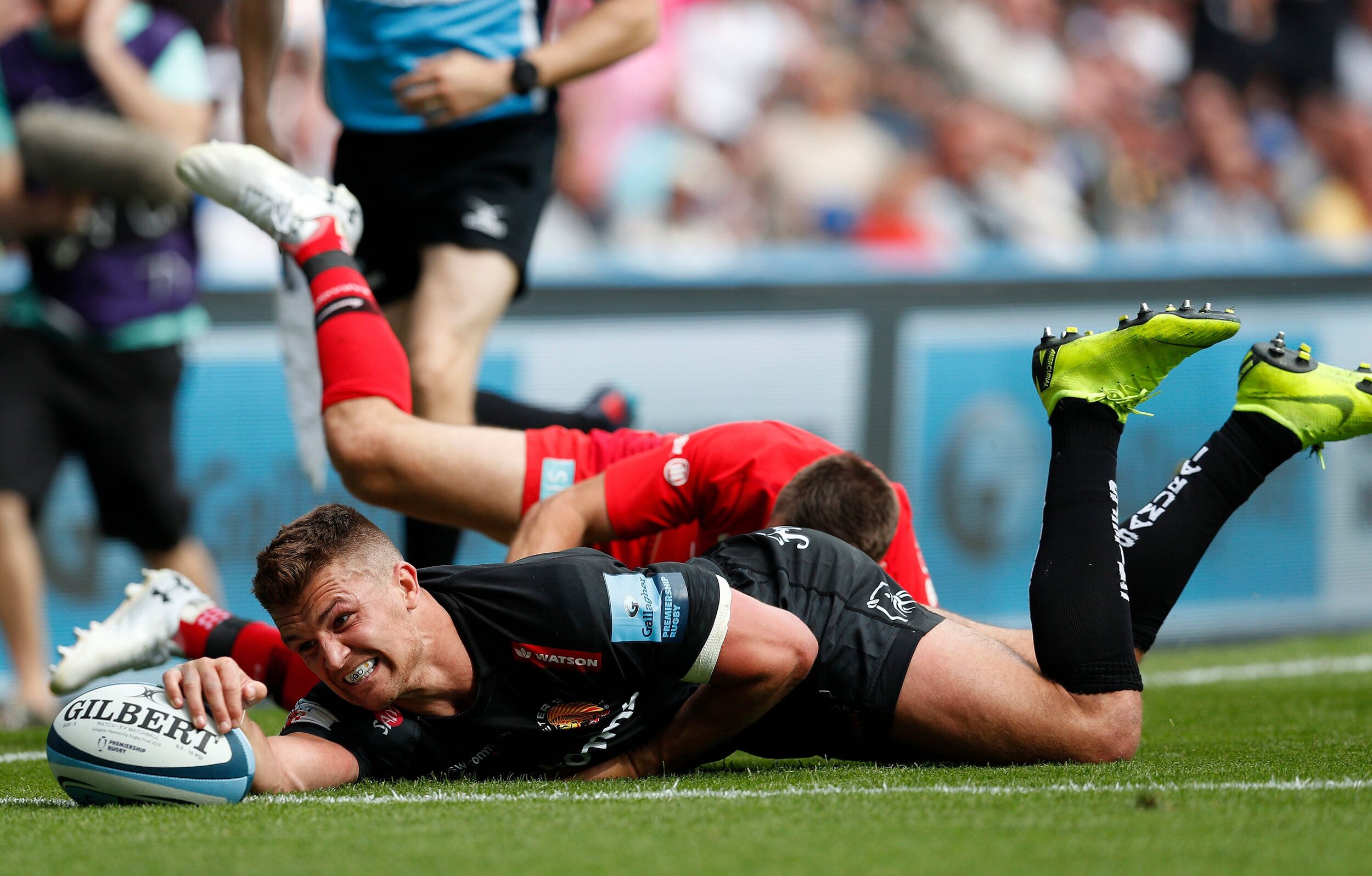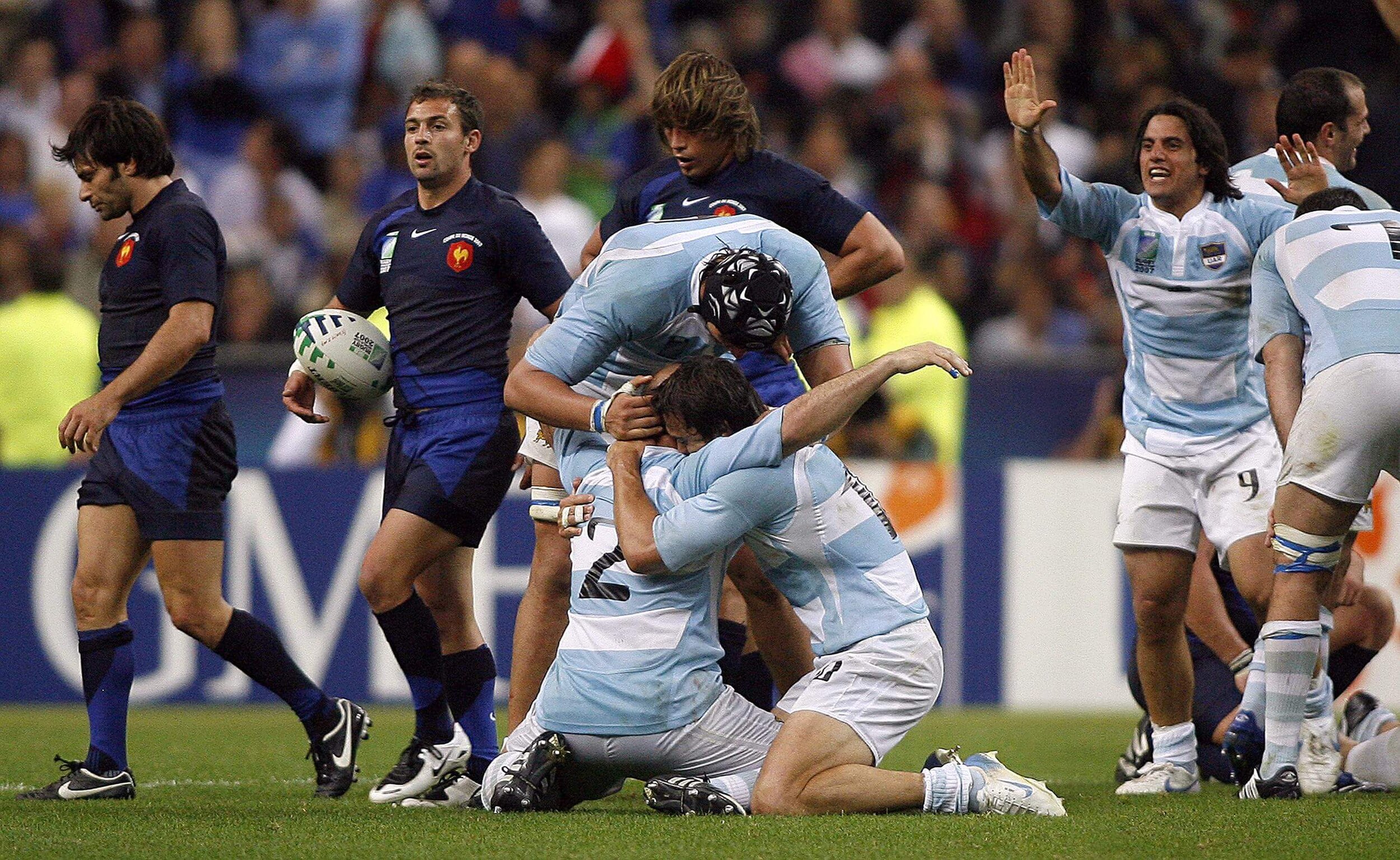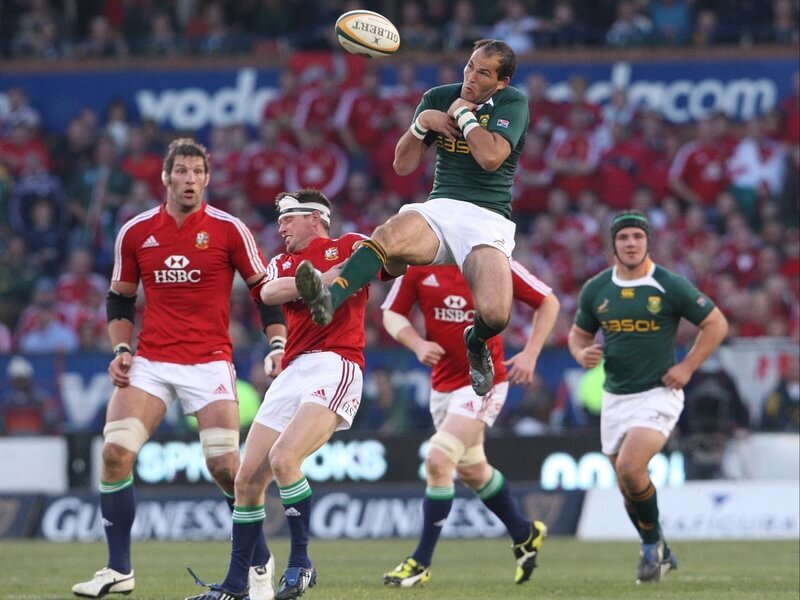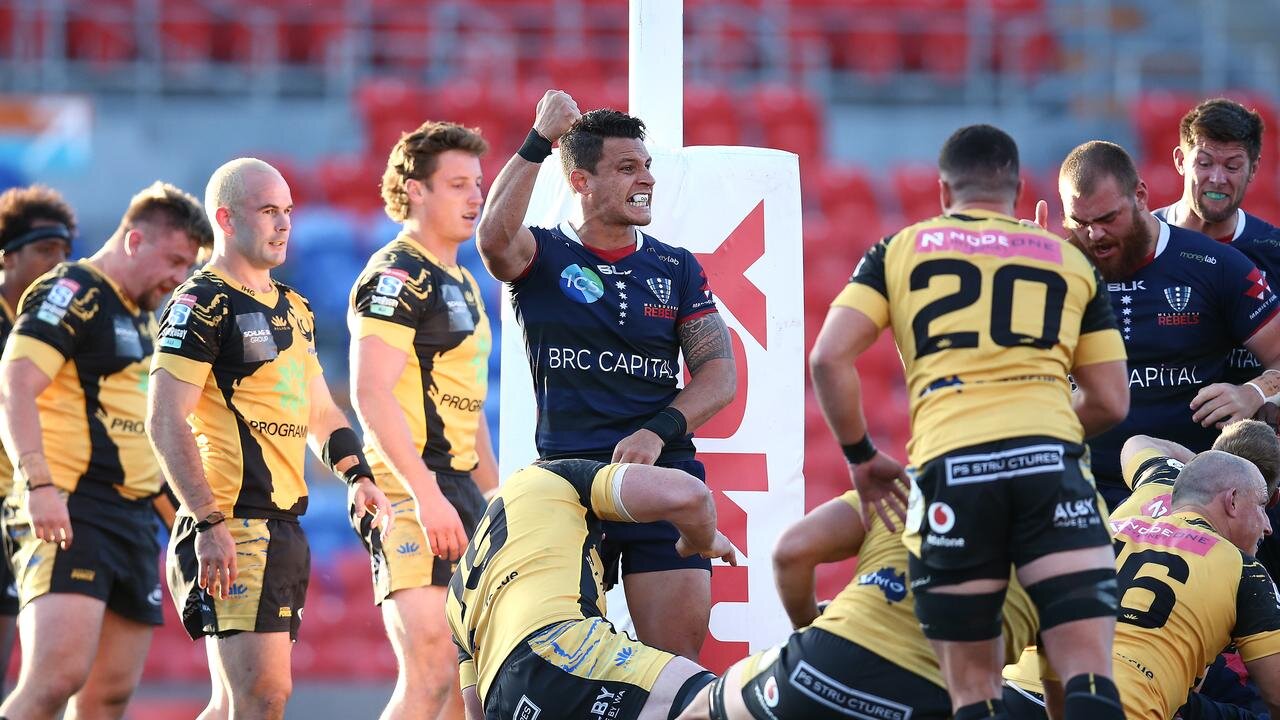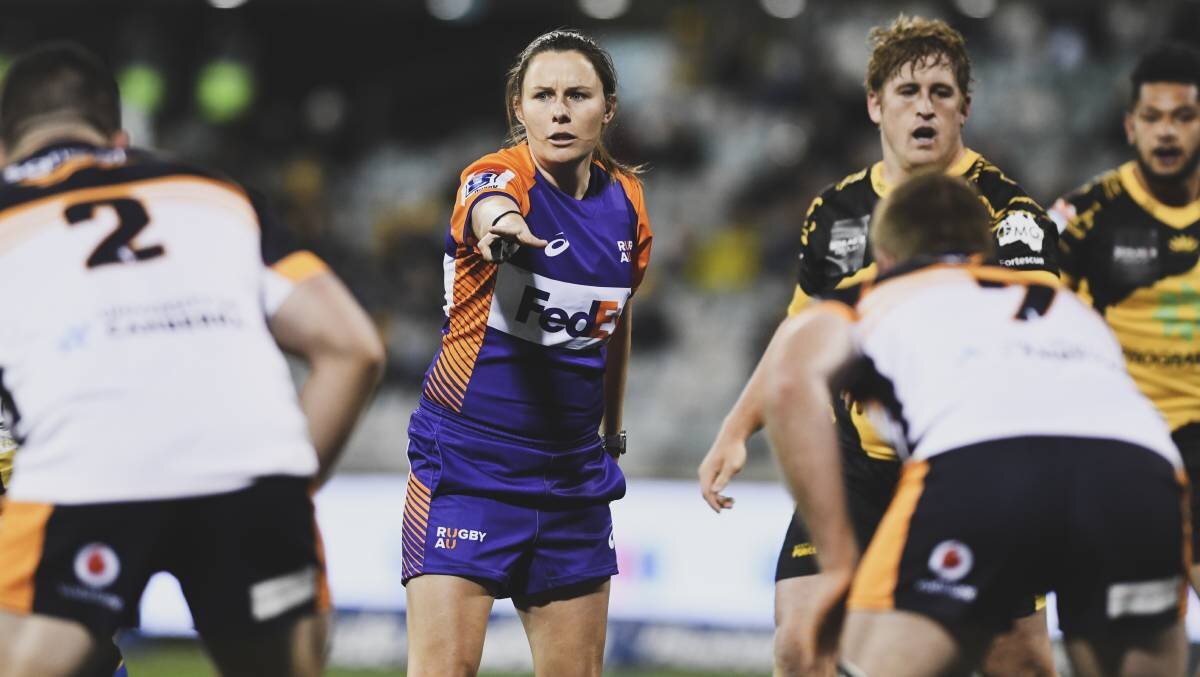Rugby’s Greatest Matches: Waratahs 33-32 Crusaders
Bernard Foley (centre) and his Waratahs teammates celebrate the final whistle in the 2014 Super Rugby final
Credit: Mark Metcalfe/Getty Images
Cometh the hour, cometh the man is how the saying goes.
When the heat comes on, only the coolest heads prevail; when the world goes mad, he who stays sane and thinks straight is king.
On a balmy Sydney night in August 2014, Bernard Foley was that man.
His actions under the brightest of lights as he attempted to guide his New South Wales Waratahs team to its maiden Super Rugby title against the perennial champions, the Crusaders, live long in the memory as decisive in one of the more riveting rugby spectacles you are ever likely to see.
As a lifelong Waratahs fan, I can confess to a certain amount of bias in declaring this match to be one of rugby’s greatest, but I believe in no uncertain terms it will stand up under any neutral examination.
I remember well sitting on my sofa, almost shaking in anticipation, having seen my beloved boys downed in finals twice before by the Christchurch juggernaut, as the likes of Foley, Israel Folau, the ever-reliable Adam Ashley-Cooper and Michael Hooper stared down Dan Carter, Keiran Read, Richie McCaw and the rest of the household Kiwi names.
But even I could not have predicted what was to follow.
Crusaders enter as heavy favourites as Waratahs stare history down
It is quite something how often the biggest matches in rugby, usually disappointments in the round-ball game, often become the most thrilling and most absorbing affairs.
One need only look at the previous entry in The Flanker’s ‘Greatest Matches’ series to the ‘Sexton Final’ of 2011 to prove that point.
However, this particular final was not expected to live up to those heady heights. The Crusaders entered the final against the Waratahs as heavy favourites.
The Australians topped the regular season competition from their Kiwi opponents in 2014, with both sides having recorded solid victories in their semi-finals against the Brumbies and Sharks respectively.
Even home advantage, a courtesy given to the highest-seeded side in the Super Rugby final, did not translate into any serious backing - even Kiwi great Andrew Mehrtens, who had spent the season as a kicking coach with the Australian outfit, couldn’t bring himself to back them.
He told the Sydney Morning Herald before the match: "I've enjoyed working with the Tahs this year, I've been really impressed with their work ethic and the way they play, but I can't go into bat for them against my old team.
"My money is on the Crusaders, just because of the ability they have to lift themselves for the occasion."
Diehard Crusader Andrew Mehrtens had been working with the Waratahs’ kickers, including Foley, in 2014
Credit: Unknown
It also didn’t help that the New South Wales outfit had made two previous Super Rugby finals, in 2005 and 2008, both of which had ended in defeat. Their adversary on both of those occasions? You guessed it - the Crusaders.
This was in many ways an archetypal Australia v New Zealand clash, with domestic internationals littering the starting lineups of both sides, with both sides boasting 13 internationals from their own nation as well as two non-native internationals.
There were some familiar names to Northern Hemisphere audiences on the Christchurch outfit’s bench that day as well - England scrum-half Willi Heinz, who played his part in knocking his home nation of of the 2019 World Cup in such spectacular style, and Wales wing Johnny McNicholl, who has a track record of starring roles in major finals.
‘Tahs start strong and Carter loses out again
However, it was the Waratahs who came steaming out of the blocks at ANZ Stadium in Sydney, racing into a 14-0 lead in the first 15 minutes through an Adam Ashley-Cooper try and three Foley penalties.
There was some further luck on the Tahs’ side even after Matt Todd hit back with a ‘Saders try - Dan Carter’s withdrawal through an ankle injury halfway through the first half was symbolic of his major occasion luck, having also been knocked out of the 2011 World Cup through injury.
Matt Todd of the Crusaders scores a try in the 2014 Super Rugby final
Credit: Getty Images
That was a game-changer for the Aussies, who were suddenly facing a side not controlled by arguably the greatest fly-half of all time but instead the talented but erratic Colin Slade.
It was clear the Waratahs had the pedal on the floor early on - the outside back division, boasting the likes of Rob Horne, Ashley-Cooper, Alofa Alofa and Israel Folau (pre-cancellation), tore into their beleaguered opposition, with the only wonder being that they didn’t score further tries in the opening quarter after the man known as ‘Swoop’ sliced through the defence to bundle over in the fourth minute.
The Waratahs continued to press and ultimately wrangled themselves three more penalties, with Foley demonstrating that his shooting boots had well and truly arrived after missing the conversion for the try.
However, as champion teams do, the Crusaders hung in and struck back, first through Todd’s converted score, off some delightful hands from captain Keiran Read, and then with two more Slade penalties that were matched by Foley, leaving the game delicately poised at 20-13 at half-time.
Crusaders storm in front as hunted becomes the hunter
In the same way their hosts had owned the first quarter, the first portion of the second half was a wave of red and black.
Fijian giant Nemani Nadolo did what he does best, latching onto a long ball from Andrew Ellis and holding off two covering defenders to power over in the corner shortly after the break to level the scores but put momentum squarely in the Kiwi outfit’s hands.
The game then became a staring contest as Foley and Slade started to trade kicks back and forth, with Slade’s two to Foley’s one leaving the Tahs 26-23 down and in need of a spark.
And as he has done so very many times for both his club and his country, Adam Ashely-Cooper stepped up to the mark again.
Adam Ashley-Cooper crosses for his second try in the 2014 Super Rugby final
Credit: AP
As he stepped through the stern Crusaders wall to put his side back in charge, the roar around ANZ told you everything you needed to know - the home crowd truly believed their time had come.
At that point, it became a backs-to-the-wall mission - only a stunning cover tackle from the comparatively diminutive Nick Phipps stopped Nadolo claiming his second score, and Slade’s metronomic boot soon had them back within range at 30-29, with less than five minutes on the clock.
Sink or swim
Bernard Foley steps up to kick the winning penalty goal in the final
Credit: PA
No-one can doubt the mettle of the Crusaders.
Many regard them as a team that sweeps to victory, that it is not the effort to win that it is to everyone else, but anyone watching this final knows the falsehood in that ideal.
Having suffered so many setbacks in that final and dug themselves out of a massive first-half hole, it looked for all the world when the Waratahs were penalised for offside, the resulting Slade penalty was the final movement in a rugby concerto for the ages and that it was the final nail in an exhausted Waratahs coffin.
However, history tells us that there is always one more chance.
WIth time rapidly running out, the great Richie McCaw, who made a living from managing not to be penalised in rucks, was caught out entering from the side by referee Craig Joubert.
45 metres out. 78th minute. One point down. A rugby nation on your shoulders.
He may have had his detractors since and his inconsistencies may have been well noticed, but let no man say that when the heat was on the highest, that Bernard Foley did not stand up.
The kick seemed, at least to me, to last an eternity in the air. It was not in the least clear whether it had the direction or the legs until the camera behind the posts showed it skimming the top of the crossbar on it's way over right at the junction of the bar and left-hand upright.
The Waratahs celebrate the 2014 Super Rugby title
Credit: AP
Two minutes later, as Brendan McKibbin hoofed the ball into the Sydney night sky, I sat there emotionally shattered, aware I had watched one of the more stunning games of rugby you are likely to see.
As Michael Hooper raised the Super Rugby trophy aloft, it was as though some great biblical saga had finally ended as the plucky underdog finally defeats the behemoth that blocked his path.
This truly was a clash worthy of the two best teams in Southern Hemisphere rugby in that year, and both sides played their part in the telling to perfection to result in one of the great matches of all time, and none greater than Bernard Foley.
As I said at the start - cometh the hour, cometh the man.




